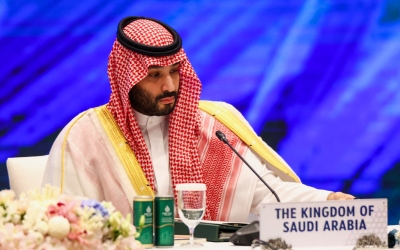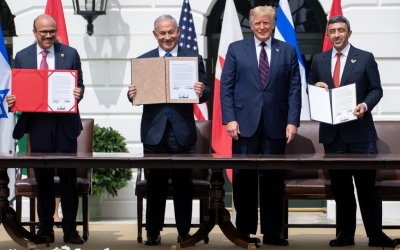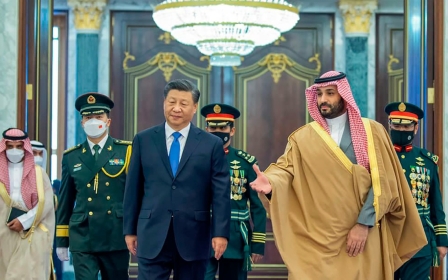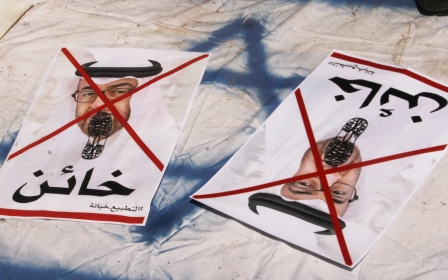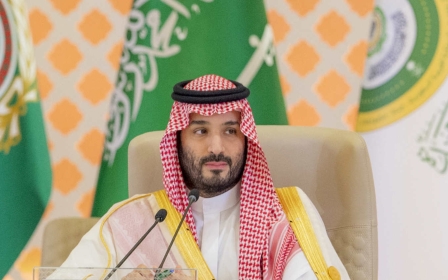Any proposed Saudi-Israel-US deal is a hoax to deny Palestinians their rights
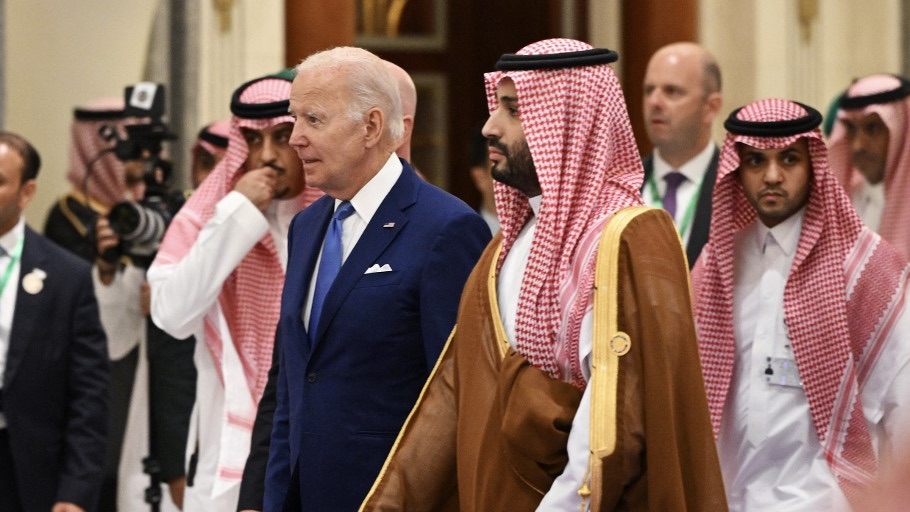
The New York Times’ top columnist Thomas Friedman has been anticipating in an opinion piece a possible deal in the making in the Middle East that would be a game-changer for the region.
Through his privileged contacts inside the US administration, Friedman claims that President Joe Biden - read carefully! - “is wrestling with whether to pursue the possibility of a US-Saudi mutual security pact that would involve Saudi Arabia normalising relations with Israel, provided that Israel make concessions to the Palestinians that would preserve the possibility of the two-state solution”.
So, if Saudi Arabia normalised relations with Israel, it could get in exchange a mutual security pact with the US and unspecified Israeli concessions, not to finally accomplish the two-state solution but simply for the preservation of such a hypothetical possibility. In other words, nothing, zero.
Making concessions to preserve the possibility of a two-state solution practically means an indefinite extension of the current status quo that has existed for decades, while the creeping annexation of further chunks of the occupied West Bank by bellicose Israeli settlers shielded by trigger-happy Israeli soldiers would continue. The net result would be no decent conditions for any kind of two-state solution.
This is another hoax to deny once again the Palestinians’ rights.
New MEE newsletter: Jerusalem Dispatch
Sign up to get the latest insights and analysis on Israel-Palestine, alongside Turkey Unpacked and other MEE newsletters
The Trump administration threw them under the bus by packaging the Abraham Accords. The Biden administration, which is a bit more moderate and empathetic but not less perfidious, is simply deceiving them once again.
Moving the goalposts
The approach is the usual mistaken one US administrations have been following for decades: an unnerving incrementalism which primarily serves Israel, and which never produces results but only short - very short - illusions.
Such illusions have always been dashed by clever Israeli politicians, who have been systematically moving the goalposts of the negotiations. Prime Minister Benjamin Netanyahu has excelled in such accomplishments for the last 15 years.
If Palestinians again play this American game, it will show that their desperation is now beyond the point of no return.
If US Secretary of State Antony Blinken, National Security Adviser Jake Sullivan and the White House’s top Middle East envoy Brett McGurk - the alleged architects of this new hoax - are indeed convinced of the goodness of their new proposal, they'll soon realise how easily and quickly Israel will bamboozle them once more.
The best that Palestinian and Washington radio stations could do in such a situation would be to broadcast 24/7 the Who’s rock hit Won’t Get Fooled Again.
If it all goes according to Washington’s plan, Israel would be in its usual win-win situation. It would get a boost by normalising its relations with Saudi Arabia and it would continue the creeping annexation of the West Bank while preserving the two-state solution in formaldehyde, as it has since 2003.
Saudi Arabia would get a vague US security commitment that might be barely needed while the kingdom is normalising its relations with Iran; the US would stop, with a claimed diplomatic success, the slow death of Pax Americana in the region. As for the Palestinians, of course, they will be fooled again.
It is uncertain how such a deal would really serve Saudi Arabia’s interests. Friedman lists them: “A Nato-level mutual security treaty that would enjoin the United States to come to Saudi Arabia’s defence if attacked (most likely by Iran); a civilian nuclear programme, monitored by the United States; and the ability to purchase more advanced US weapons.”
For the record, on 14 September 2019, Iranian drones launched from Iraq halved Saudi oil production for more than a week, while the already existing US military shield over Saudi Arabia remained idle. That lesson should not have been forgotten at the Saudi royal court.
Furthermore, while the US is struggling to keep at bay Russia in Europe and China in Asia, it cannot be taken for granted that it would be so keen to bind itself in a mutual security pact centred once again in the Middle East, especially after 20 years of disastrous war in the region.
Blinded by double standards
As to other possible benefits for the Saudi kingdom, Crown Prince Mohammed bin Salman (MBS) could ask his former mentor, UAE ruler Mohammed bin Zayed (although they are no longer on good terms), how difficult it has been for the Emiratis to see their weapons procurement respected by Washington after they signed the Abraham Accords with Israel - and how Israel was instrumental in preventing the UAE getting US advanced weapons.
The same would presumably apply to any Saudi military shopping list and, on steroids, its civilian nuclear ambitions.
Regardless of Jerusalem’s fading democratic credentials, the pro-Israel lobby in Washington is still highly influential and obviously blinded by double standards. As such, Israel should easily be able to bamboozle both Washington and Riyadh without difficulty.
Such bamboozlement will be much easier than expected if you consider that to induce the Saudis to sign the deal, Friedman claims that Netanyahu should be ready to offer the following (it is not clear if this is the proposal the Biden administration is considering): “An official promise not to annex the West Bank - ever.” A promise? From Netanyahu? Really!
“No new West Bank settlements or expansion outwards of the existing settlements.” Jerusalem is omitted by Friedman. Israel will then enlarge its municipal boundaries and continue to build illegally. As for the rest of the occupied West Bank, what the NYT columnist is effectively outlining is the ratification of its current condition of Bantustan.
Friedman claims that Netanyahu should be ready to offer the following: 'An official promise not to annex the West Bank - ever.' A promise? From Netanyahu? Really!
“No legalisation of wildcat Jewish settlement outposts.” Merely a little slap on Israel’s wrist.
“Transferring some Palestinian-populated territory from Area C in the West Bank (now under full Israeli control) to Areas A and B (under Palestinian Authority control) - as provided for in the Oslo Accords.” After the ordeal the Palestinians have experienced for decades, such a proposal would be utterly provocative. Palestinians know perfectly well that their security and rights are worth nothing if they live in Areas A, B or C.
Furthermore, MBS would have to review Saudi Arabia's current policy agenda, which is looking east. Riyadh intends to join the BRICS bloc and offer energy supplies to China denominated in renminbi.
The latter is a far more important potential game-changer, towards which Friedman should direct his gaze for the huge implications it could have on the dollar as a reserve currency for world trade. Sooner or later this issue could become a ticking bomb for US debt sustainability.
Wishful thinking
What Friedman claims about the consequences of a Saudi-Israeli deal - “peace between Israel and Saudi Arabia, the custodian of Islam’s two holiest cities, Mecca and Medina, would open the way for peace between Israel and the whole Muslim world” - could be revealed as wishful thinking.
Such a development cannot and should not be taken for granted, especially if Israel continues, with impunity, to humiliate and vex the Palestinian people.
Friedman is also deluding himself if he believes that the perspective of a no-deal with Saudi Arabia might push Israel's far-right to give up its plan to annex the West Bank and its 2.9 million Palestinian inhabitants.
Finance Minister Bezalel Smotrich and his acolytes know perfectly well that the US will never apply any real pressure on Israel to stop the annexation. They will cashier the deal with Saudi Arabia, and they will move on with the ongoing de-facto annexation of the West Bank.
Whoever the US president is at that time will produce another semantic trick to mislead and fool the Palestinians again.
I had the privilege and pleasure to meet and talk at length with Thomas Friedman when I was an ambassador to Iraq the last decade. I barely recognise him now.
This is the cherry on the cake. How can he possibly claim, as in his latest op-ed, that the two-state solution is the “cornerstone of US Middle East diplomacy"?
Where has he been living and where has he been getting his news from in the last quarter of a century? The sad truth is that the Israel that Friedman and the Biden administration used to dream about probably no longer exists.
The views expressed in this article belong to the author and do not necessarily reflect the editorial policy of Middle East Eye.
Middle East Eye delivers independent and unrivalled coverage and analysis of the Middle East, North Africa and beyond. To learn more about republishing this content and the associated fees, please fill out this form. More about MEE can be found here.



